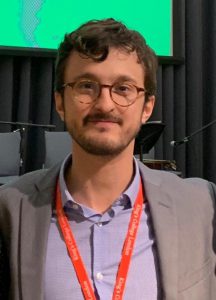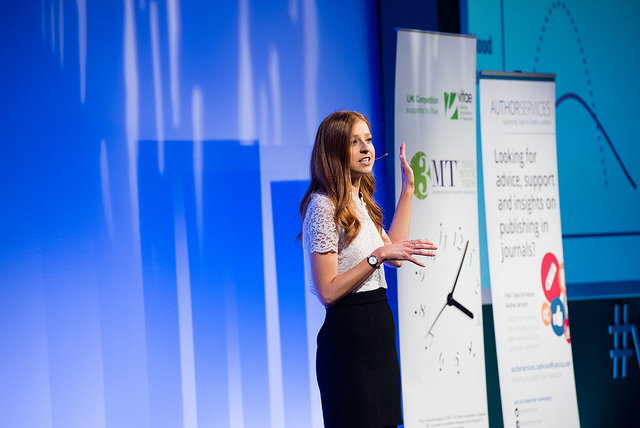
Sogol Salimipour
King’s College London PhD student Sogol Salamipour has been selected to participate in this year’s prestigious Three Minute Thesis national competition final, which will take place during Vitae Connections Week 2020.
Sogol was shortlisted along with entrants from 52 other universities after winning the King’s College London 3MT 2020 Competition in April, and will now participate alongside five other doctoral researchers from across the UK for a chance to win an engraved trophy and £3,000 to spend on public engagement activities. She was praised by the King’s judges in April for giving an “excellent and confident presentation, with a clear explanation of the significance and value of her research”.
She was one of 50 PhD students who took part this year from across the faculties at King’s, and she now follows in the footsteps of King’s 3MT finalists from 2014, 2017, and 2018. Sogol is based in the Department of Women & Children’s Health within the Faculty of Life Sciences & Medicine, and her thesis is titled How can we better identify women at risk of premature birth?
We spoke to Sogol to hear her thoughts ahead of the national final:
Three Minute Thesis has undoubtedly been one of my favourite experiences during my PhD so far. I was initially in two minds about taking part as I don’t usually enjoy public speaking.
However, I’m so glad that I did, as I really appreciated having the opportunity to think about my research in a different way and I feel that this has given me the confidence to take on more opportunities with enthusiasm and excitement!
I’m delighted to be chosen as a finalist in the national competition and I’m very excited to represent King’s College London, showcasing my research to a wide audience and seeing the diversity of work among other PhD students in the country. I highly recommend taking part!
Nigel Eady, Director of Research Talent at King’s, said:
Many congratulations to Sogol on getting through to the national finals of this year’s 3MT competition, and we wish her the very best of luck.
Every year, 3MT showcases the exciting and varied research discoveries happening at King’s, and the hugely talented doctoral students who work hard to distil their research into engaging presentations.
This year was no different. Our students always tell us what a valuable experience it was, not only in taking part, but in having crafted a punchy description of their research – something they can use in many situations, whether chatting to friends and family or interviewing for a job.
Watch the King’s 3MT 2020 finalists’ presentations, and hear their thoughts and advice about taking part:

Felipe Tirado
Felipe Tirado, Dickson Poon School of Law, was this year’s King’s 3MT runner-up with Violation and redress: judges and accountability for crimes against humanity in the dictatorships of Argentina and Brazil. The judges said Felipe gave a “logical discussion of his research, which was very easy for the non-specialist to understand”.
Taking part was a great experience during my first year at King’s. It enabled me to think critically about my thesis, while making it understandable for new audiences. It also allowed me to practice presentation skills and learn from the other participants, and was a great way to keep me motivated during lockdown!
It’s a great opportunity for anyone starting a PhD and struggling to explain their thesis to family members! It also helps final year students, as they will have to summarise their work in job interviews or when applying for research grants.
My advice is to make your presentation as clear and concise as you can, and to practice a lot – especially with colleagues in unrelated fields. It’s possible that my friends from computer science now know a bit more about crimes against humanity, or at least they were very convincing when they were pretending to listen! Make your slide engaging and ensure that it catches the audience’s attention, right from the start.
I learned a lot from the other participants’ research, and it was a great opportunity to reflect upon my thesis, to practice my presentation skills, and to overcome what’s left of my stage fright. But above all that, I’m now confident that next time a family member asks me what I’m doing with my life, I’ll be able to explain, and they will understand!
Elyse Couch, Institute of Psychiatry, Psychology & Neuroscience, Identifying the benefits of early diagnosis in dementia – a mixed methods project.
Taking part in 3MT gives you the opportunity to tell a story about why your research is important outside of academia – and on the day itself, it’s great to learn more about the interesting work being done by other PhD students outside of your own field.
Louise Hesketh, Faculty of Life Sciences & Medicine, Gone in a heartbeat.
I thoroughly enjoyed taking part in the final and would definitely recommend the experience to other PhD students. I always struggled to explain my thesis quickly to non-scientists, and now it’s easy!
My advice to those taking part in the future would be to practice in front of anyone and everyone, as this helped me adapt my narrative to allow a wide range of people to understand what makes my research matter.
Taryn Hutchinson, Institute of Psychiatry, Psychology & Neuroscience, Imagine a brighter future: development of a school-based positive imagery intervention to target anhedonia in adolescents.
As a first year PhD student, I was initially hesitant about whether to enter 3MT because my data collection hadn’t yet begun. I’m really glad that I did, as it allowed me to really focus and bring together the research I had done since starting my PhD.
It also gave me the opportunity to learn how to communicate my research in a more layperson-friendly way, I got to see the amazing ways in which researchers in other fields are communicating their work, and although I was nervous, I really enjoyed it.
So whatever stage you’re at in your PhD, I’d definitely recommend entering!
Patricia Moises, Faculty of Arts & Humanities, Reading Women and Horses in the 19th Century.
3MT forced me to distil my arguments into a few main points, and in a logical sequence. Stripping my research back to the very basics was difficult, but it helped me to identify flaws in my arguments and to justify the validity of my research.
I would recommend the competition to all PhD students simply because you’re compelled to step back and see your research through different eyes. What’s more, this ‘elevator pitch’ could be key to attracting interest and funding for your research.
Chantelle Spiteri, Faculty of Dentistry, Oral & Craniofacial Sciences, Targeted Delivery to Break Symmetry.
Communication is essential in research, but we risk losing our audience’s attention when we mention a bunch of technical words. 3MT prompted me to think about how to simplify and summarise my own research.
Taking part boosted my confidence and served as a learning opportunity in communicating complex concepts. The King’s event was well managed and fair, and it presented a positive feel among the coordinators and contestants.
My advice is that even if you’re a first year PhD student, taking part in this event is surely worth a try!
Book online by Monday 14 September to watch this year’s Vitae 3MT National Competition Final, which will take place online on Wednesday 16 September 12:00-13:00.
And look out for announcements later this year about the King’s College London Three Minute Thesis 2021 Competition for your chance to get national exposure for your research!

